Samaaro + Your CRM: Zero Integration Fee for Annual Sign-Ups Until 30 June, 2025
- 00Days
- 00Hrs
- 00Min
Influencer marketing has emerged as a powerful tool for event promotions in the UAE, where digital engagement plays a crucial role in audience outreach. With a high social media penetration rate, businesses are increasingly turning to local influencers to drive event registrations and build community engagement.
However, the UAE’s digital landscape is unique, requiring localized influencer strategies that align with cultural, legal, and platform-specific preferences. In this guide, we will explore:
By the end of this guide, you will have actionable insights to successfully integrate influencer marketing into your event promotion strategy in the UAE.

The UAE boasts one of the highest social media usage rates in the world, making influencer marketing a key strategy for driving event registrations. However, success requires a strong understanding of digital habits, platform preferences, and cultural nuances in the region.
By understanding these factors, event organizers can tailor influencer partnerships and campaign strategies for maximum impact in the UAE market.

Selecting the right influencers for event promotion in the UAE requires a strategic approach, ensuring that partnerships drive authentic engagement and conversions. Not all influencers are equally effective—relevance, credibility, and audience alignment play a crucial role.
Partnering with influencers who resonate with UAE’s audience ensures greater visibility, trust, and higher event registrations.

Once the right influencers are identified, the next step is to establish strong, mutually beneficial partnerships that yield measurable results.
By strategically selecting, collaborating, and measuring influencer partnerships, event organizers in the UAE can maximize brand exposure, credibility, and attendee conversions.
Influencer-generated content plays a critical role in event marketing , offering an authentic, engaging, and highly shareable way to drive registrations. The key is to strategically integrate influencer content across multiple marketing channels while ensuring strong calls to action that convert followers into attendees.
Influencer-generated content, when strategically aligned with event goals, can significantly boost brand awareness and ticket sales in the UAE market.
The UAE has strict influencer marketing regulations designed to ensure transparency, ethical practices, and compliance with cultural values. Understanding these guidelines is essential for running a successful influencer campaign while maintaining brand credibility and avoiding legal risks.
By following legal guidelines, respecting cultural sensitivities, and maintaining ethical standards, brands can build successful, compliant influencer campaigns that resonate with UAE audiences while avoiding legal complications.
6. Integrating Influencer Marketing with Overall Event Promotion Strategies

Influencer marketing is a powerful tool, but its effectiveness is maximized when integrated into a broader, multi-channel event promotion strategy. By combining influencer efforts with digital ads, email marketing, content marketing, and organic social media, event organizers can create a cohesive, high-impact campaign that drives registrations and engagement.
By strategically integrating influencer marketing with digital advertising, content marketing, and email campaigns, event organizers can maximize registrations, enhance audience engagement, and achieve long-term event success.
Influencer marketing has become a crucial component of event promotion in the UAE, helping brands reach engaged, trust-based communities. The key strategies discussed include:
For event organizers in the UAE, influencer marketing presents an unparalleled opportunity to connect with targeted audiences, enhance brand credibility, and increase registrations. By implementing these strategies, brands can elevate their event marketing efforts and ensure long-term success.
Samaaro is a leading event marketing platform, trusted by top brands in the UAE to streamline event promotions and maximize audience engagement. With advanced features that integrate seamlessly with influencer-driven strategies, Samaaro empowers event organizers to boost registrations, track campaign performance, and enhance audience experiences. Partner with Samaaro to unlock the full potential of influencer marketing for your next event.
WhatsApp has become India’s primary communication tool, bridging both personal and professional interactions. With over 500 million users, it offers event promoters a direct, cost-effective, and high-engagement channel to drive registrations. Whether it’s a corporate summit, trade show, or cultural festival, leveraging WhatsApp groups allows organizers to reach diverse audiences instantly and effectively.
This blog will cover key strategies to help event organizers:
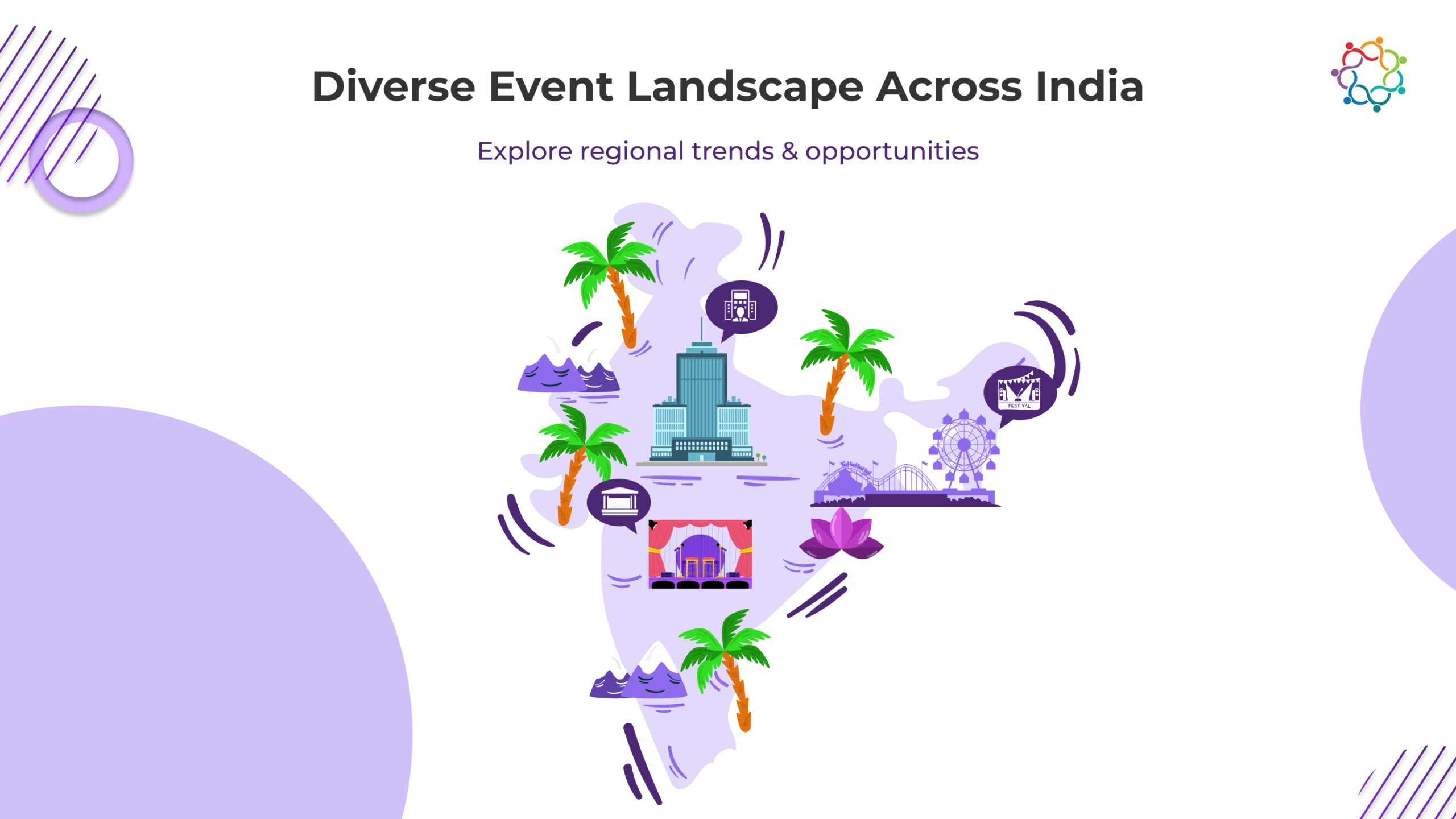
India’s event industry is one of the largest and most dynamic in the world, with a projected market size of over $9 billion by 2025. It encompasses a wide spectrum of events, including:
As digital adoption accelerates, the way events are promoted and marketed has changed significantly. Traditional methods like emails and social media ads alone are no longer enough—audiences expect more direct, real-time, and engaging communication, making WhatsApp a critical event promotion tool.
Mobile-First Audience Engagement
India has over 1.2 billion mobile phone users, and WhatsApp has penetrated over 85% of the smartphone market. This makes it the most effective direct channel for event promotions, far surpassing email open rates and social media reach.
Regional and Vernacular Language Growth
Over 50% of Indian internet users prefer consuming content in regional languages. WhatsApp allows event marketers to create localized and multilingual campaigns, making it easier to engage audiences in Tier 2 and Tier 3 cities, where event participation is growing rapidly.
Rise in Hyper-Personalized Event Marketing
Attendees today expect personalized event experiences, and mass broadcasting is no longer effective. WhatsApp’s group segmentation and one-on-one messaging features enable event organizers to tailor promotions, send custom invites, and interact directly with potential attendees.
The Need for Instant and Interactive Communication
Unlike emails, which have an average open rate of 20-30%, WhatsApp messages see read rates as high as 98%. Features like instant messaging, voice notes, and multimedia sharing make it easier to:
| Challenges | Opportunities with WhatsApp |
| High competition for audience attention. | Direct, one-on-one communication ensures higher engagement. |
| Managing diverse regional audiences. | WhatsApp supports regional language messaging for better reach. |
| Low email and social media engagement. | WhatsApp boasts higher open and response rates. |
| Difficulty in tracking attendee interest. | Group interactions and read receipts offer real-time insights. |
Understanding these trends and challenges helps event organizers effectively leverage WhatsApp to boost registrations, enhance engagement, and build stronger attendee relationships in India’s evolving event landscape.
With over 500 million active users in India, WhatsApp is more than just a messaging app—it is a primary communication tool for businesses, communities, and event organizers. Unlike emails or traditional advertisements, WhatsApp offers real-time, direct, and highly personalized engagement, making it an effective platform for event promotions.
Key advantages of WhatsApp for event marketing in India:
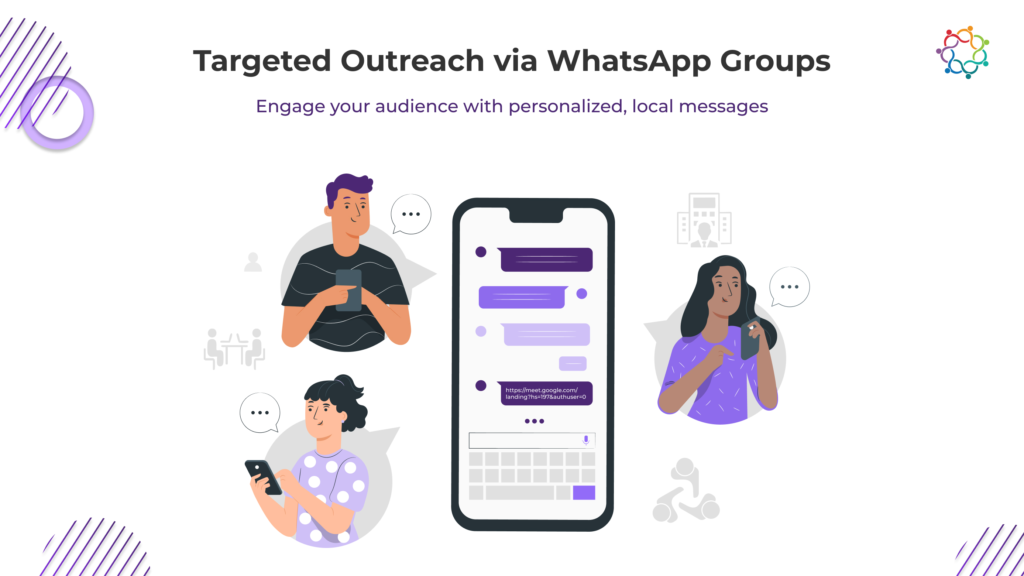
To maximize event registrations, organizers need to strategically segment their WhatsApp groups instead of relying on mass broadcasting. Effective segmentation allows for more personalized communication, ensuring that the right message reaches the right audience.
Here are some practical segmentation strategies:
| Segmentation Type | How It Helps | Example |
| By Interest | Ensures content relevance and engagement | Separate groups for tech conferences, cultural festivals, or business networking events. |
| By Geography | Targets location-specific attendees | City-based groups (Delhi, Mumbai, Bangalore) for regional meetups. |
| By Audience Type | Allows for tiered messaging | VIP attendees, exhibitors, sponsors, and general attendees get different updates. |
| By Engagement Level | Prioritizes highly interested participants | Groups for early registrants or repeat attendees to offer special incentives. |
For one-to-one event promotions without creating multiple groups, broadcast lists can be highly effective. Unlike groups, messages sent via broadcast lists appear as personal messages in the recipient’s inbox, increasing response rates.
Best practices for using WhatsApp Broadcast Lists:
By combining targeted WhatsApp groups with personalized broadcast lists, event organizers can create a structured and highly effective promotional strategy.
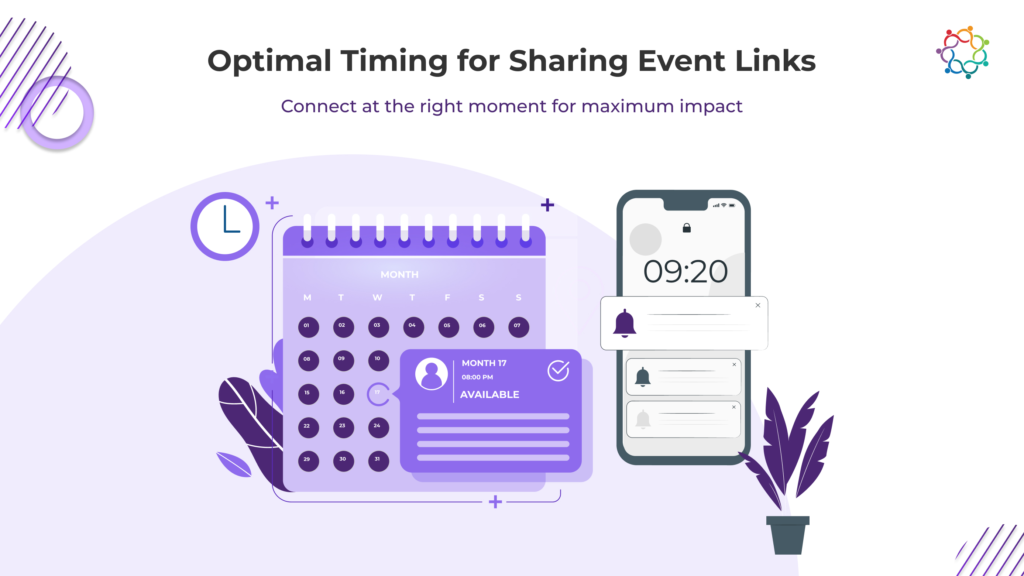
The timing of event promotion messages significantly impacts engagement and registration rates. In India, daily routines and cultural habits influence when users are most likely to check and engage with WhatsApp messages.
A compelling WhatsApp message can significantly boost registrations. Here’s how to create engaging and effective messages:
To refine messaging strategies, A/B testing can help determine what works best for different audience segments.
By monitoring click-through rates and engagement levels, organizers can continuously optimize their WhatsApp campaigns for better performance.
Influencer marketing has grown significantly in India, with local influencers playing a crucial role in event promotions. Unlike national celebrities, regional influencers have a strong, trusted connection with their local communities. When they endorse an event, it carries more credibility and leads to higher engagement and conversions.
Many brands and event organizers have leveraged WhatsApp and influencer marketing for successful promotions. For example:
By integrating local influencers into WhatsApp campaigns, event organizers can expand their reach, boost credibility, and drive higher conversions in regional markets.
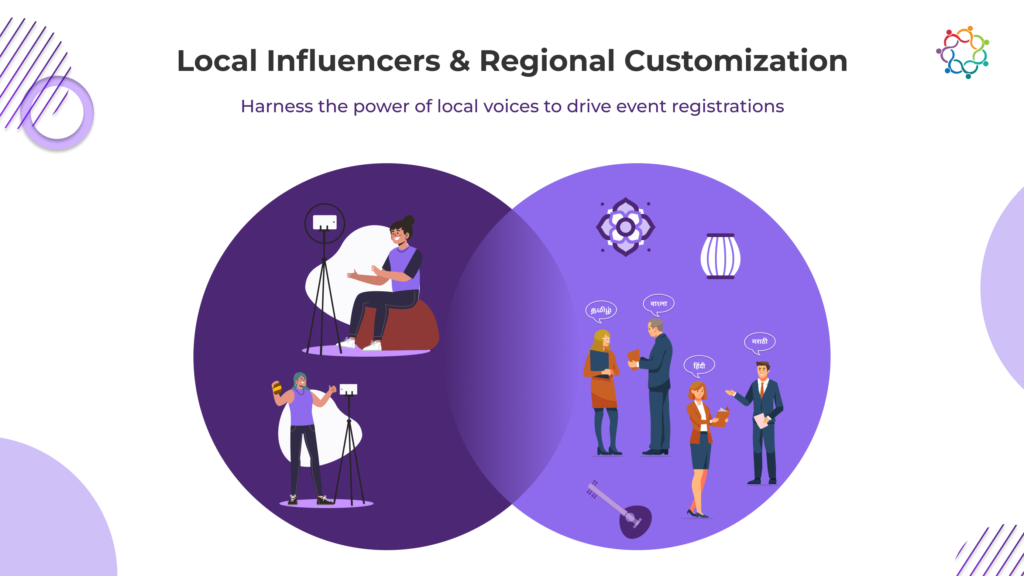
India’s diversity extends beyond language—it includes cultural practices, communication preferences, and digital behaviors, all of which influence how people respond to event promotions. A one-size-fits-all strategy won’t be effective when marketing across different states.
For instance:
By adapting WhatsApp promotions to fit regional habits, language, and cultural contexts, event organizers can maximize engagement and drive higher registrations across India.
WhatsApp Business provides powerful tools that help event organizers streamline communication, enhance engagement, and build credibility with local audiences. With over 500 million users in India, businesses that use WhatsApp Business features effectively can drive higher event registrations and maintain long-term attendee relationships.
Key WhatsApp Business Features for Event Promotions
1. Automated Messages for Instant Engagement
Example:
2. Catalogs for Showcasing Event Details
Example: A music festival can upload a catalog featuring ticket categories, VIP passes, and artist lineups, making it easier for attendees to browse and purchase.
3. Labels for Efficient Attendee Management
4. Localized Messaging for Maximum Impact
Example:
By leveraging WhatsApp Business tools, event organizers can automate workflows, provide localized experiences, and manage attendees efficiently—leading to higher conversions and better audience engagement.
To optimize WhatsApp-based event promotions, organizers must track key performance metrics and refine their strategies based on data insights.
1. Key WhatsApp Metrics to Monitor
2. Using WhatsApp Analytics for Continuous Improvement
Example:
As WhatsApp continues to evolve, several upcoming features and trends will further enhance event marketing in India:
1. AI-Powered Chatbots for Personalized Conversations
2. Deeper CRM and WhatsApp API Integration
3. WhatsApp Payments for Seamless Ticketing
4. Advanced Group Features for Large-Scale Event Communities
5. Interactive Multimedia & AR Integration
By combining WhatsApp Business tools, data-driven strategies, and emerging trends, event promoters in India can:
Leveraging WhatsApp intelligently will be a game-changer for event marketing in India in 2025 and beyond.
Successfully promoting events in India through WhatsApp requires a deep understanding of audience behavior, regional diversity, and strategic engagement tactics. In this guide, we explored:
By implementing these tactics, event organizers can boost registrations, enhance attendee engagement, and build lasting event communities.
Samaaro is a leading event marketing platform trusted by top brands in India, offering seamless integration with WhatsApp-based promotion strategies. With data-driven insights, automation tools, and cutting-edge event solutions, Samaaro helps organizers streamline event management, maximize outreach, and drive higher registrations in today’s competitive landscape.
Ready to take your event promotions to the next level? Discover how Samaaro can help you achieve your goals.
Cold calling remains a vital sales strategy in event promotion, even as digital channels like email, social media, and AI-driven automation continue to grow. While some may see it as outdated, direct phone conversations still offer a personal touch that digital methods often lack—allowing for real-time engagement, immediate problem-solving, and stronger rapport-building with prospects.
However, as buyer behaviors evolve and technology advances, traditional cold calling methods must adapt. Sales teams that fail to modernize their techniques risk lower engagement rates, reduced conversions, and an inability to keep up with competitors leveraging tech-driven sales strategies.
This guide explores key strategies to future-proof your cold calling approach in 2025, including:
By refining your approach, you can increase conversion rates, boost event registrations, and ensure cold calling remains a valuable sales asset in the coming years.
Event sales have transformed significantly in recent years due to shifts in buyer expectations, technological advancements, and increased competition. Understanding these changes is crucial for sales teams looking to enhance their cold calling effectiveness in 2025.
Cold calling alone isn’t enough anymore. Successful sales teams integrate CRM systems, AI-powered dialing, and automation tools to track interactions, personalize conversations, and improve response rates.
By recognizing these industry shifts and embracing modern sales techniques, cold calling can remain a highly effective event sales strategy in 2025.
As the sales landscape evolves, so must the approach to cold calling. Today’s prospects expect value-driven conversations, and outdated, script-heavy tactics no longer work. In 2025, successful cold calling strategies revolve around personalization, empathy, and strategic outreach.
Cold calls that feel robotic or overly salesy get ignored. Instead, a conversational, problem-solving approach builds trust and engagement.
Example of a poor opener:
“Hi, I’m John from XYZ. I wanted to tell you about our event solutions.”
Example of an effective opener:
“Hi, Sarah. I noticed your company recently expanded its event portfolio. Many event teams I’ve spoken with are struggling with attendee engagement—how has that been for you?”
This approach shifts the focus from selling to engaging, making prospects more likely to stay on the call.

Technology has transformed cold calling from a manual, time-consuming process into a data-driven, highly efficient sales strategy. In 2025, integrating VoIP, AI-powered dialing, CRM systems, and analytics tools is essential for maximizing results.
With many sales teams operating remotely or on the go, mobile-friendly CRM apps and cloud-based call management systems allow reps to:
By integrating smart technology, cold calling becomes a more strategic, scalable, and results-driven sales approach.

A well-structured script is the foundation of successful cold calling, but rigid, robotic pitches often fail. In 2025, personalized, flexible scripts tailored to buyer personas and pain points are essential for engaging prospects effectively.
Example 1: The Problem-Solution Approach
“Hi , I came across and noticed you’ve been actively running large-scale events. Many teams I speak with struggle with . How has that been for you?”
(Pause for response, engage in discussion)
“We’ve helped similar teams streamline by . Would you be open to a quick call next week to see how this could work for you?”
Example 2: The Question-Driven Approach
“Hi , quick question—how are you currently handling ?
(Let them answer, listen actively, and respond based on their pain points)
“We’ve worked with to help them achieve . Would it make sense to explore how we can help you as well?”
The key to a successful script is adaptability—sales reps should use these frameworks as guides but adjust based on each conversation.

Cold calling is no longer a guessing game. With advanced analytics and CRM tracking, sales teams can leverage data-driven insights to optimize their approach and maximize conversions.
Key Cold Calling Metrics to Track
By using data to refine cold calling strategies, sales teams can increase efficiency, boost engagement, and drive more event registrations in 2025.

Cold calling is most effective when combined with social selling—the practice of engaging prospects through platforms like LinkedIn and Twitter before making a call. This multi-touch approach helps warm up leads, making them more receptive to sales conversations.
By combining social selling with cold calling, sales reps create warmer, more engaging conversations that improve conversion rates.
As technology evolves, cold calling is becoming smarter, not obsolete. The future will be driven by AI, automation, and continuous optimization based on real-time insights.
Cold calling in 2025 isn’t about dialing more—it’s about calling smarter, leveraging technology, and integrating multi-channel strategies to make every conversation count.
To successfully future-proof your cold calling strategy, it’s essential to put these insights into action. Here’s a step-by-step checklist to help you implement the strategies covered in this guide:
Combine Social Selling with Cold Calling
Next Steps: Start implementing these strategies today, experiment with different techniques, and refine your approach based on data-driven insights. The future of cold calling isn’t about dialing more—it’s about calling smarter.
Cold calling in event sales is evolving, but its core value remains—building meaningful connections and driving event success. By integrating personalization, technology, and data, sales teams can enhance their effectiveness and stay ahead of industry shifts.
The key to success in 2025 lies in adaptability—embracing new tools, refining approaches based on insights, and maintaining a human touch in every conversation.
At Samaaro, we empower event professionals with cutting-edge solutions to elevate their outreach and maximize event success. Ready to take your event sales strategy to the next level? Start implementing these techniques today and share your experiences with us!
In 2025, WhatsApp has solidified its position as an indispensable tool for event promotion. With its expansive user base and continuous introduction of interactive features, it offers unparalleled opportunities for organizers to engage potential attendees. WhatsApp groups, in particular, have emerged as a powerful channel to drive event registrations, fostering direct and personalized communication with target audiences.

WhatsApp’s commitment to enhancing user experience has led to the introduction of several interactive features in 2025:
Leveraging these features within WhatsApp groups can significantly enhance event promotion efforts:
By strategically integrating these evolving features into WhatsApp group interactions, event organizers can create a dynamic and engaging environment that not only captivates potential attendees but also streamlines the registration process, ultimately maximizing event participation.
Effective audience segmentation and strategic group organization are pivotal in leveraging WhatsApp for event promotion. By categorizing your audience based on specific criteria, you can deliver tailored messages that resonate, thereby enhancing engagement and boosting registrations.
Once segments are defined, establish dedicated WhatsApp groups for each category:
To manage these groups effectively:
By thoughtfully segmenting your audience and organizing WhatsApp groups accordingly, you can deliver personalized and relevant communications that significantly enhance event registrations and attendee satisfaction.
Timing plays a crucial role in the effectiveness of your event promotion efforts on WhatsApp. Understanding when your audience is most receptive can lead to higher engagement and increased registrations.

By strategically timing your messages and continuously optimizing based on audience behavior, you can maximize the impact of your event promotions on WhatsApp, leading to higher registration rates and successful events.
Leveraging WhatsApp Business can significantly enhance your event promotion efforts by providing tools designed for professional communication and audience engagement.
For larger events, integrating the WhatsApp Business API with your event management system or CRM can streamline communication:
By effectively setting up and utilizing WhatsApp Business features, you can create a professional and interactive platform that enhances event promotion and attendee engagement.

Incorporating high-quality multimedia content into your WhatsApp event groups can significantly boost engagement and motivate participants to register and participate actively.
By thoughtfully creating and sharing engaging multimedia content, you can capture the attention of your WhatsApp group members, encourage registrations, and foster a vibrant community around your event.

Effective community management is essential to maintain an engaging and respectful environment within your WhatsApp event groups.
By implementing these community management strategies, you can create a dynamic and supportive WhatsApp group that enhances attendee experience and promotes a successful event.
As WhatsApp continues to evolve, new features and technologies are shaping how event marketers leverage the platform for promotion and engagement.
WhatsApp has evolved into a powerful tool for event promotion, offering a direct, engaging, and interactive channel to drive registrations and community engagement.
By leveraging new features, audience segmentation, strategic messaging, engaging multimedia content, and community-building strategies, event marketers can maximize their reach and impact in 2025. With emerging trends like AI-driven automation, enhanced analytics, and omnichannel integrations, the platform is set to become even more valuable for event professionals.
Now is the time to implement these best practices and transform WhatsApp into a high-converting event marketing channel.
At Samaaro, we’re committed to empowering event marketers with cutting-edge solutions that drive engagement and success. Explore how our event marketing platform can help you make the most of WhatsApp and beyond.
Email marketing continues to be one of the most effective channels for event promotion. As we approach 2025, the landscape is evolving faster than ever with emerging technologies, AI-driven personalization, and mobile-first innovations. For marketers, staying ahead means understanding how to adapt strategies to meet the demands of a diverse audience. In this comprehensive guide, we delve into the best email marketing strategies for event promotion in 2025, discussing trends from personalization and automation to advanced data analytics and list management. Whether you’re planning a small workshop or a large-scale conference, these insights will help you reach your audience effectively and drive event registrations.

In the age of data, one size no longer fits all. Personalization has moved beyond simply addressing the recipient by name. Today’s successful email campaigns use dynamic personalization to offer content tailored to individual interests and behaviors.

As events become more sophisticated, the process of managing registrations can be streamlined using automation and AI technologies. This not only saves time but also ensures that your audience receives timely and relevant communications.

In 2025, the mobile-first approach is not just a trend; it’s a necessity. With more users accessing emails on smartphones and emerging devices like smartwatches and foldable phones, ensuring that your email design is responsive and engaging on all screens is critical.
Data Analytics and Performance Tracking for 2025 Email Campaigns
Data is the backbone of modern email marketing strategies. With advanced analytics, you can measure the performance of your email campaigns and make informed decisions to optimize future efforts.

An often-overlooked aspect of email marketing is list hygiene. A clean, well-maintained email list is vital for ensuring high deliverability rates and maximizing campaign effectiveness.
Integrating Emerging Trends and Technologies
The future of email marketing lies in the integration of cutting-edge technologies that create immersive and interactive experiences for subscribers.
Email marketing remains a cornerstone of event promotion—even as the digital landscape evolves dramatically by 2025. By embracing dynamic personalization, leveraging AI and automation, optimizing for mobile-first experiences, and relying on robust data analytics, marketers can craft campaigns that truly resonate with diverse audiences. Additionally, maintaining clean and up-to-date email lists ensures that your message reaches the right people at the right time, while integrating emerging technologies keeps your strategies ahead of the curve.
As you prepare your email marketing strategy for the coming years, consider the following takeaways:
Implementing these strategies will not only drive higher engagement and registration rates but also position your brand as a forward-thinking leader in event promotion email campaigns. Start planning now, and ensure that your strategy is ready to adapt to the exciting opportunities that 2025 promises.
In 2025, the evolution of email marketing is transforming how events are promoted—from AI-powered personalization and automation to mobile-first design and robust data analytics. Embracing these innovations is crucial to not only capture your audience’s attention but also to drive higher engagement and registration rates. At Samaaro, we’re committed to empowering event organizers with an all?in?one platform that integrates these advanced strategies. Our innovative solutions simplify the creation of dynamic, personalized email campaigns that connect with diverse audiences, streamline event registrations, and provide real?time insights to continuously refine your approach. By partnering with Samaaro, you ensure that your event promotion strategy is future?proof, scalable, and backed by cutting?edge technology designed to deliver tangible results. Get ready to transform your email marketing efforts and elevate your event experiences with Samaaro – Book A Demo or Start Your Free Trial!
Salesforce is a powerful Customer Relationship Management (CRM) tool that has revolutionized how businesses manage customer interactions, sales, and marketing efforts. Its versatility extends to the events industry, offering seamless integration for event planning, marketing, sales, and attendee engagement.
By leveraging Salesforce, event organizers can streamline lead management, automate marketing campaigns, track event performance, and enhance attendee experiences. This blog explores how Salesforce can optimize event success and drive higher ROI.
Effectively managing leads is crucial for maximizing event ROI. Salesforce provides a powerful suite of tools that streamline lead capture, scoring, nurturing, segmentation, and tracking—ensuring sales teams can efficiently convert event attendees into customers.
Salesforce integrates with event registration forms, mobile apps, and onsite check-in systems to:
This centralized approach provides a 360-degree view of every attendee, making it easier for sales and marketing teams to take action.
Prioritizing leads effectively ensures that sales teams focus on high-value prospects. With Salesforce’s AI-driven lead scoring:
This data-driven approach helps sales teams identify the most promising leads for personalized follow-ups.
Keeping leads engaged after an event is key to driving conversions. Salesforce’s automation tools enable:
With automated workflows, event organizers can keep leads warm without overwhelming sales teams with manual follow-ups.
Salesforce allows event organizers to categorize leads into meaningful segments for targeted outreach, such as:
By segmenting leads based on behavior and preferences, marketing teams can craft more effective campaigns and sales pitches.
Salesforce’s lead tracking tools provide complete visibility into the attendee journey, from registration to post-event engagement. Key benefits include:
With Salesforce, sales and marketing teams can work together seamlessly to maximize conversion opportunities.
Beyond lead management, Salesforce empowers event teams with robust sales tracking tools to monitor revenue-generating opportunities—whether it’s ticket sales, sponsorship deals, or exhibitor partnerships.
Salesforce helps track every stage of the sales process, from initial interest to closed deals. Key features include:
By structuring sales opportunities within Salesforce, event teams can ensure no revenue potential is overlooked.
With Salesforce’s pipeline management tools, event teams can:
Having a clear view of the sales pipeline ensures teams stay proactive and results-driven.
Salesforce’s robust reporting capabilities allow event organizers to:
With custom reports, sales teams can continuously improve their approach and maximize ROI.
Salesforce Sales Cloud ensures that event-related sales data flows seamlessly across teams, enabling:
This integration enhances efficiency and ensures no revenue opportunity is missed.
Salesforce’s dashboards provide event teams with an intuitive way to:
By leveraging Salesforce’s dashboards, event organizers can maintain a data-driven approach to event revenue management.
Marketing automation is key to scaling event outreach, enhancing attendee engagement, and driving conversions. Salesforce provides powerful automation tools that help event teams streamline marketing efforts, personalize communication, and measure campaign success.
Salesforce automates email campaigns, ensuring timely communication before, during, and after the event. Key benefits include:
With automated email workflows, event marketers can keep attendees engaged at every stage of the event journey.
Salesforce enables event teams to manage and track social media engagement from a single platform. This includes:
By integrating social media into Salesforce, event teams can maximize visibility and engagement effortlessly.
Understanding campaign performance is critical for optimizing event marketing strategies. Salesforce provides:
With data-driven insights, event marketers can fine-tune their promotional efforts for maximum impact.
Salesforce’s automation tools reduce manual workloads by streamlining:
By automating repetitive tasks, event teams can focus on strategy and attendee experience.
Salesforce leverages AI to deliver hyper-personalized marketing experiences by:
With AI-driven personalization, event marketers can enhance attendee engagement and improve conversion rates.
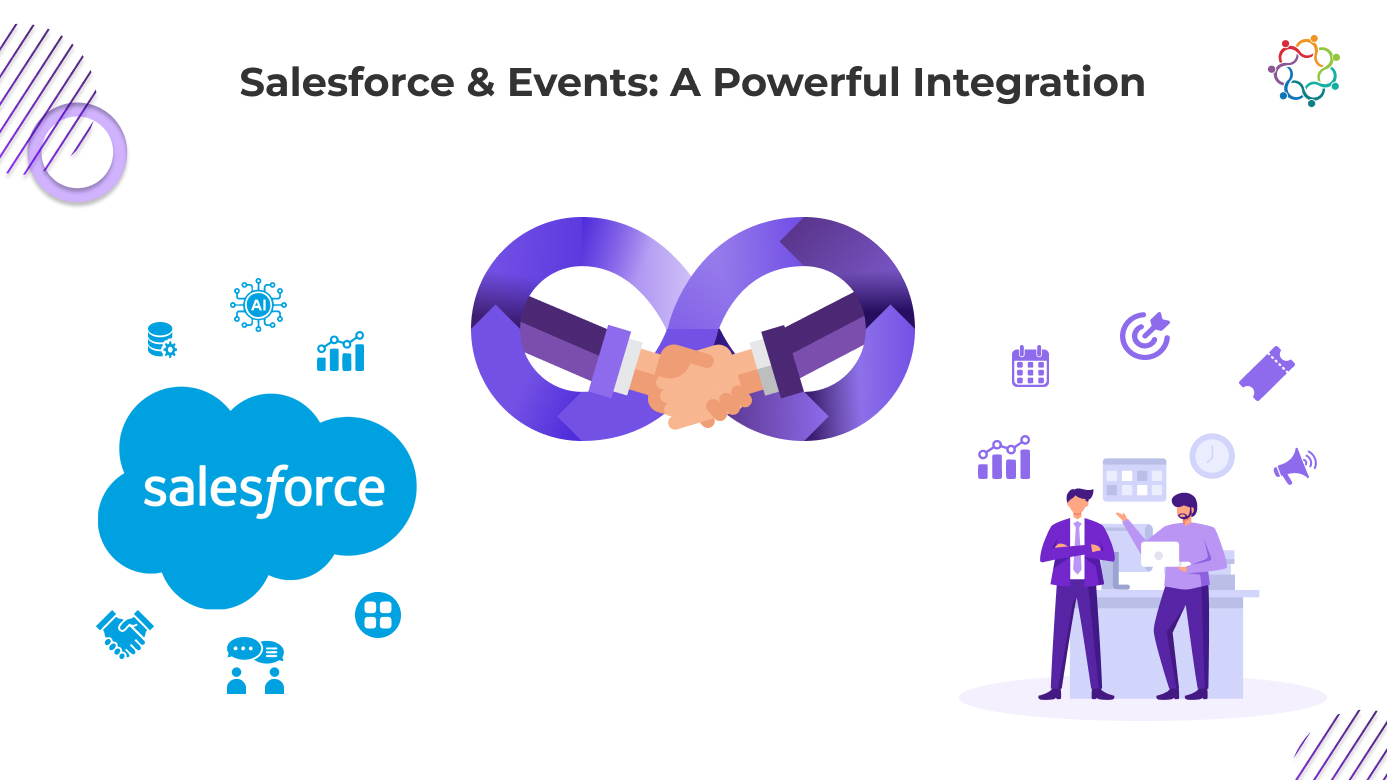
Seamless integration between Salesforce and event technology ensures a unified experience for attendees, organizers, and sales teams. By connecting Salesforce with key event tools, businesses can centralize data, improve efficiency, and drive better engagement.
Salesforce integrates with leading event management platforms like Cvent, Bizzabo, and Eventbrite, enabling:
By integrating event management software with Salesforce, teams can eliminate data silos and enhance operational efficiency.
Syncing Salesforce with mobile event apps provides real-time attendee insights and engagement tracking. Benefits include:
Mobile event app integrations ensure that all attendee interactions are recorded, enabling more personalized engagement strategies.
Connecting Salesforce with platforms like HubSpot, Marketo, and Pardot enhances event marketing efficiency by:
By integrating marketing automation tools, event teams can improve lead management and optimize conversion rates.
Ensuring consistent data flow between event tech and Salesforce helps:
A unified data ecosystem enables better decision-making and more effective event execution.
Salesforce APIs allow businesses to connect with custom-built applications and third-party event tech solutions, enabling:
Leveraging Salesforce APIs ensures organizations can build scalable, customized event solutions that align with their unique goals.
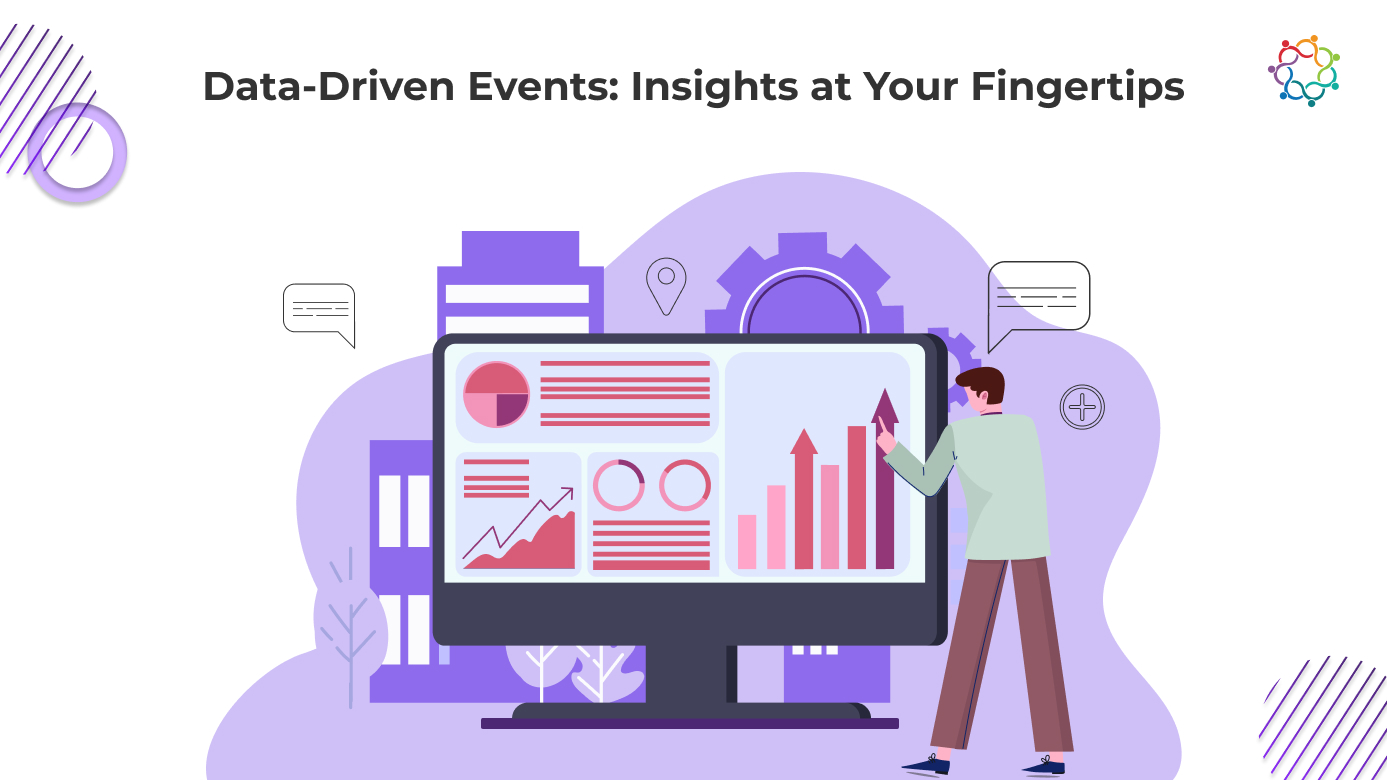
Data is at the heart of successful event management, and Salesforce provides robust reporting and analytics capabilities to help organizers measure performance, optimize strategies, and maximize ROI.
Salesforce enables event teams to generate comprehensive reports on:
With real-time access to critical event data, organizers can make informed decisions to enhance future events.
Salesforce’s dashboard capabilities allow teams to:
With intuitive data visualization, event teams can quickly interpret complex information and take proactive actions.
Salesforce’s ROI analysis tools help organizers:
By continuously analyzing event ROI, businesses can ensure better financial planning and long-term event success.
Leveraging Salesforce analytics, event organizers can:
By harnessing real-time analytics, event teams can continuously refine their strategies for maximum impact.
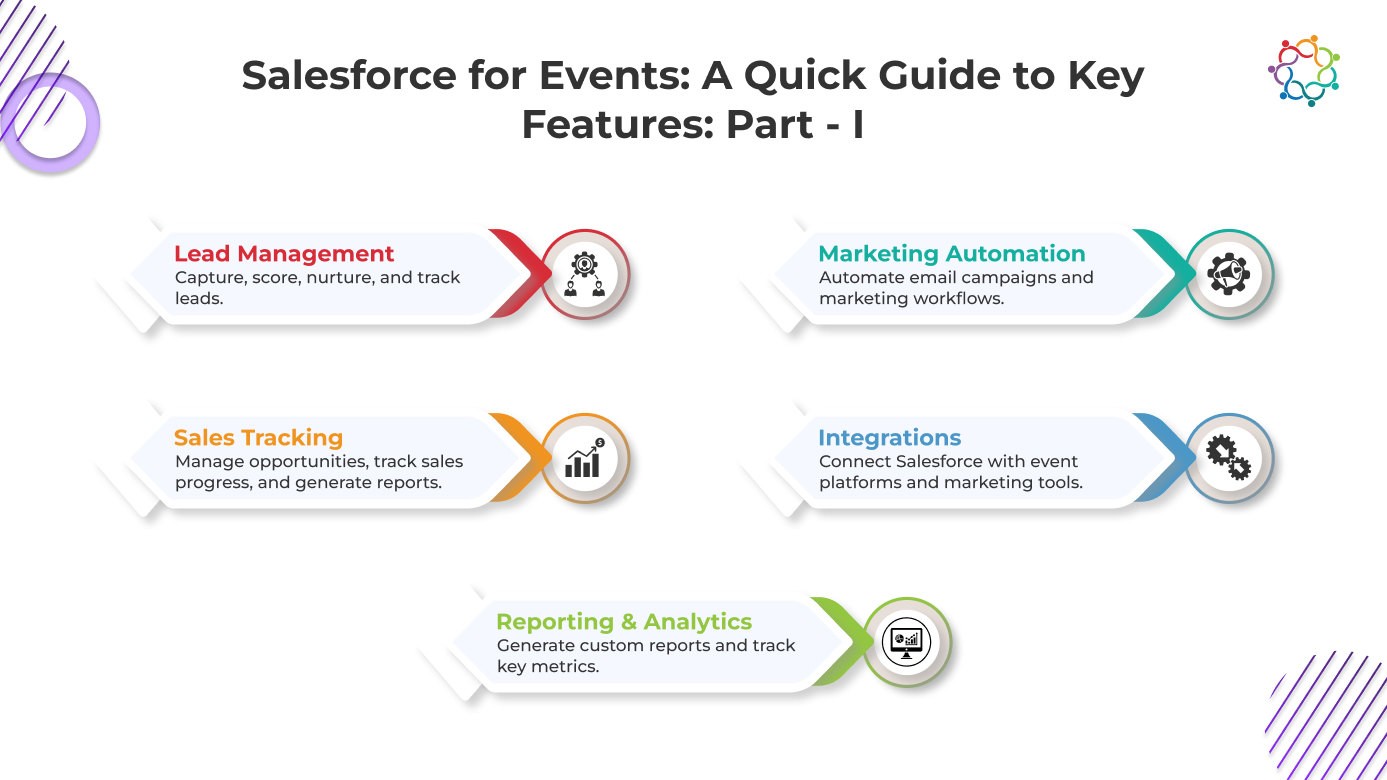
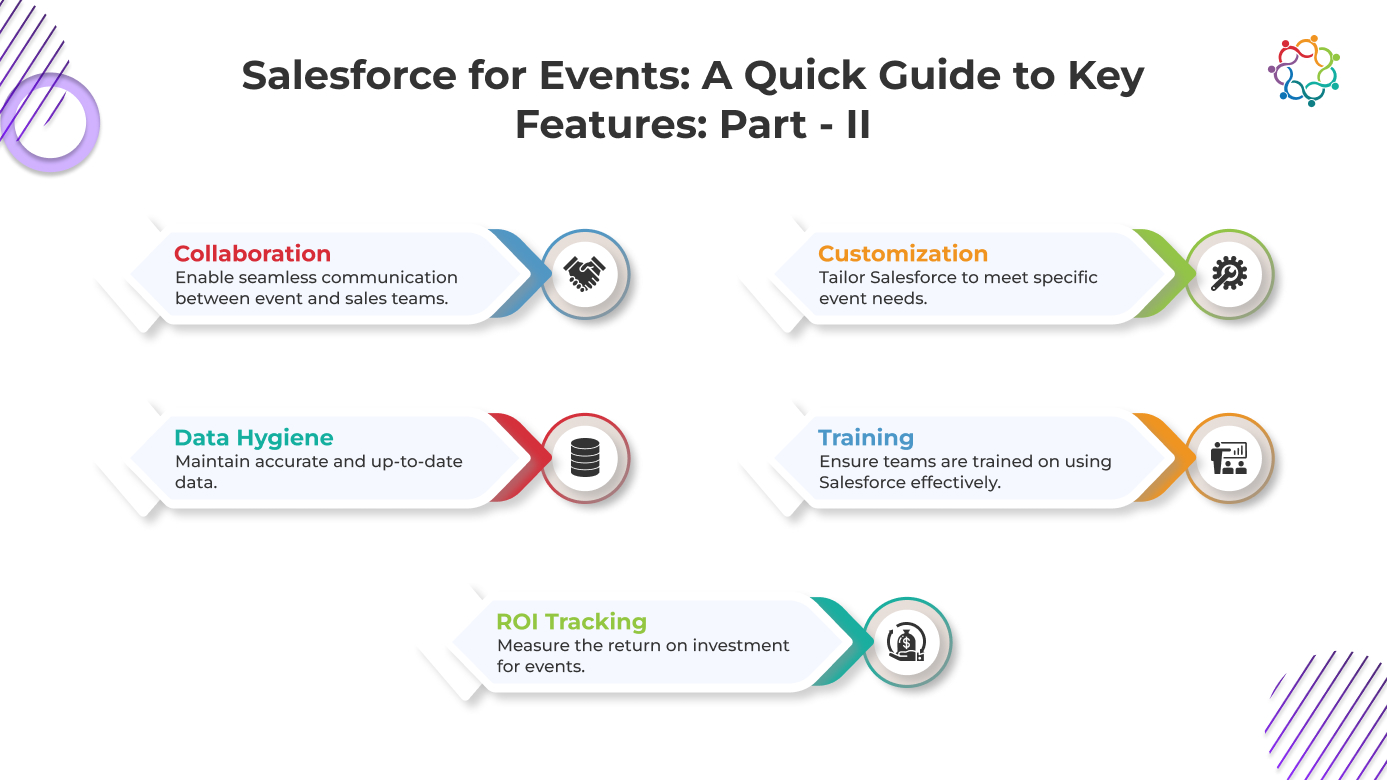
To maximize the value of Salesforce in event management, organizations must adopt best practices that enhance efficiency, data accuracy, and overall effectiveness.
By following these best practices, organizations can maximize the impact of Salesforce in their event management strategy.
Salesforce has revolutionized event management by streamlining lead capture, automating marketing, enhancing sales alignment, and providing real-time analytics. By leveraging its powerful integrations and data-driven insights, event organizers can optimize engagement, improve efficiency, and maximize revenue. At Samaaro, we recognize the impact of CRM technology in transforming event strategies. Our platform seamlessly integrates with Salesforce, enabling organizers to capture high-quality leads, automate workflows, track sales performance, and refine event execution with actionable insights. With the right tools and a strategic approach, businesses can create high-impact events that drive meaningful engagement and measurable success. Book a demo or start your free trial today to see how Samaaro can elevate your event experience.
Traditionally, sales and event teams have operated in silos, with minimal collaboration beyond sponsorships or lead generation. However, in today’s competitive landscape, integrating sales into the event planning and execution process can drive significant revenue growth and enhance attendee experiences.
By aligning goals, improving communication, and leveraging each team’s expertise, organizations can maximize event ROI, improve customer relationships, and create high-impact experiences. In this blog, we’ll explore how breaking down silos, integrating sales into event planning, and optimizing sponsorships can transform your event strategy into a revenue-generating powerhouse.
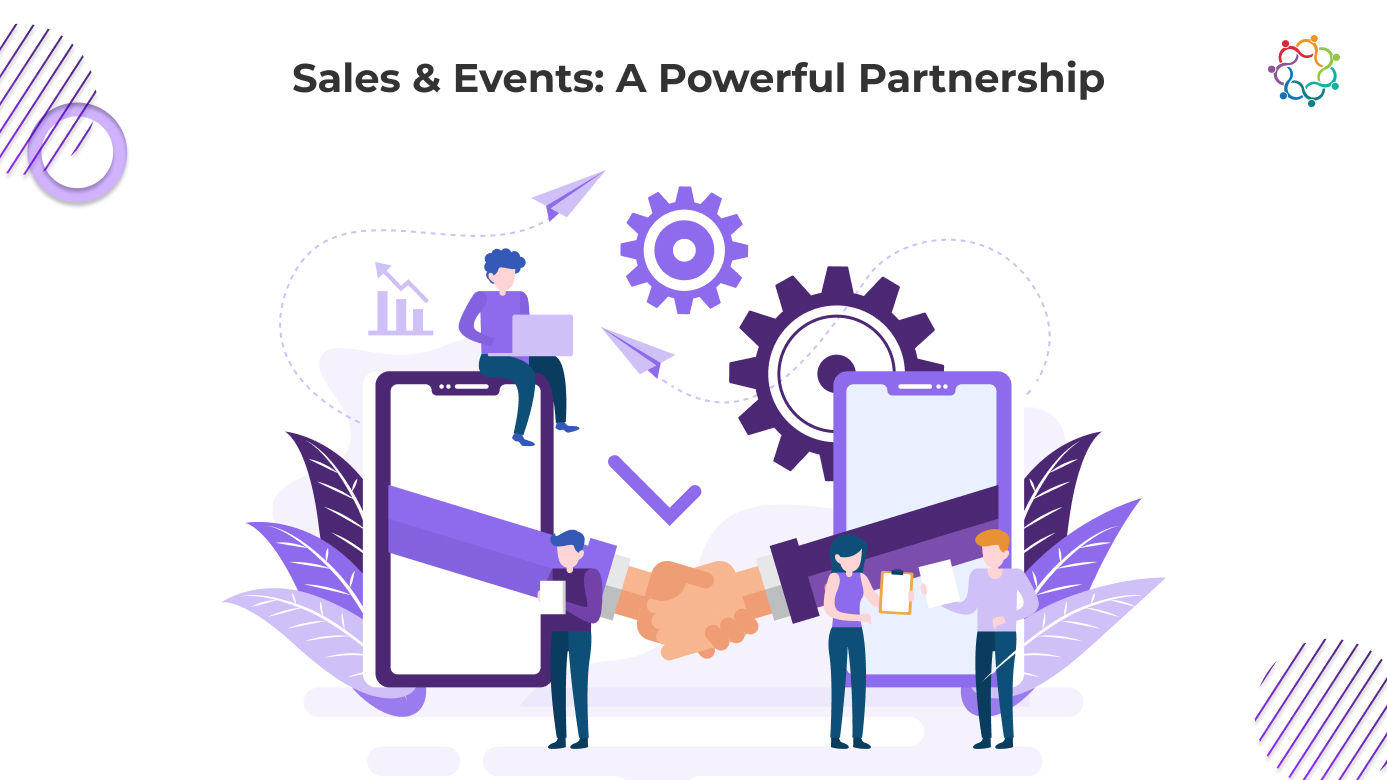
In many organizations, sales and event teams operate in silos, with separate objectives, tools, and strategies. However, true event success comes when these teams collaborate, aligning their efforts to create a seamless, engaging experience that drives meaningful business outcomes. By fostering open communication, shared goals, and cross-functional teamwork, companies can maximize the value of their events and create stronger connections with their audiences.
To work effectively together, sales and event teams need a unified vision. Instead of viewing events as isolated marketing activities, both teams should align around key objectives such as:
When both teams align on these core objectives, events transform from standalone initiatives into powerful business growth drivers.
One of the biggest challenges in collaboration is miscommunication. Sales and event teams often operate with different timelines, tools, and priorities, leading to missed opportunities. Establishing clear communication channels ensures that both teams:
By streamlining communication, sales and event teams can eliminate confusion and work together more efficiently.
Rather than operating as separate entities, companies can foster collaboration by forming cross-functional teams that include members from both sales and event departments. This approach:
By integrating team members into a unified working group, companies can break down silos and foster a more cohesive approach to event execution.
When sales and event teams collaborate effectively, the customer experience becomes more personalized, seamless, and impactful. A well-coordinated approach ensures that:
This level of coordination creates a frictionless journey for attendees, increasing the likelihood of meaningful connections and long-term relationships.
Collaboration also enables better measurement and optimization of event performance. When sales and event teams work together, they can:
With a collaborative mindset, sales and event teams can not only drive stronger event results but also refine their strategies for long-term success.
Breaking down silos between sales and event teams isn’t just about improving efficiency—it’s about creating more meaningful, impactful event experiences that drive real business value. By aligning goals, improving communication, fostering cross-functional teamwork, and delivering seamless customer interactions, companies can unlock the full potential of their events. When sales and event teams work together as true partners, the result is stronger relationships, higher engagement, and measurable success.
For events to drive real business impact, sales teams must be involved from the very beginning. Their deep understanding of customer needs, industry trends, and revenue goals makes them invaluable in shaping event strategy. By integrating sales into event planning, organizations can ensure their events are not just engaging experiences but also effective revenue-generating opportunities.
Bringing sales teams into the event planning process early allows for a more strategic approach. Sales teams can provide insights on:
By collaborating from the start, event planners and sales teams can create events that resonate with attendees and drive meaningful conversations.
Sales teams have a wealth of information about customers and prospects, including their needs, preferences, and buying behaviors. Leveraging this data allows event organizers to:
A data-driven approach ensures that attendees get maximum value from the event, increasing engagement and brand affinity.
Sales teams have established relationships with key industry players, making them valuable partners in securing event sponsorships. They can help:
A strong sponsorship strategy enhances event funding, resources, and overall experience for attendees.
A well-defined lead generation strategy requires close collaboration between sales, marketing, and event teams. Together, they can:
This structured approach ensures that leads gathered at the event translate into real business opportunities.
Events are prime opportunities for direct engagement with prospects. Sales teams can drive meaningful interactions through:
By integrating sales activation opportunities into the event, organizations can drive immediate and long-term revenue growth.
The success of an event isn’t just measured by attendance—it’s measured by post-event conversions. To ensure effective follow-up, sales and event teams should:
A strong post-event strategy ensures that leads don’t go cold and that events contribute directly to business growth.
Even the best event strategy falls flat without an empowered sales team. Organizations must equip their sales teams with the right tools, knowledge, and support to maximize event-generated opportunities.
Sales reps need to be well-versed in event themes, product offerings, and key messaging to engage attendees effectively. Pre-event training should cover:
Well-prepared sales teams can confidently navigate event conversations and position solutions effectively.
Sales teams need engaging, informative content to support their conversations. Essential sales collateral includes:
Having readily available sales materials ensures reps can provide valuable information on the spot.
Seamless CRM integration is crucial for tracking and managing event-generated leads. Best practices include:
With an integrated system, sales teams can efficiently nurture and convert leads without manual data entry delays.
Providing on-site support enhances sales effectiveness during events. Organizations should offer:
These resources ensure that sales teams can make the most of every interaction.
To continuously improve event-driven sales efforts, tracking key performance metrics is essential. Organizations should monitor:
By analyzing these insights, sales and event teams can refine strategies for future events, ensuring continued success.
Integrating sales into the event planning process and providing the right enablement tools transforms events from simple brand awareness activities into powerful revenue-driving opportunities. When sales teams are involved from the start, equipped with the right resources, and supported with seamless lead management, events become a catalyst for business growth. The key to success lies in collaboration, strategic planning, and continuous optimization—ensuring that every event delivers tangible results.
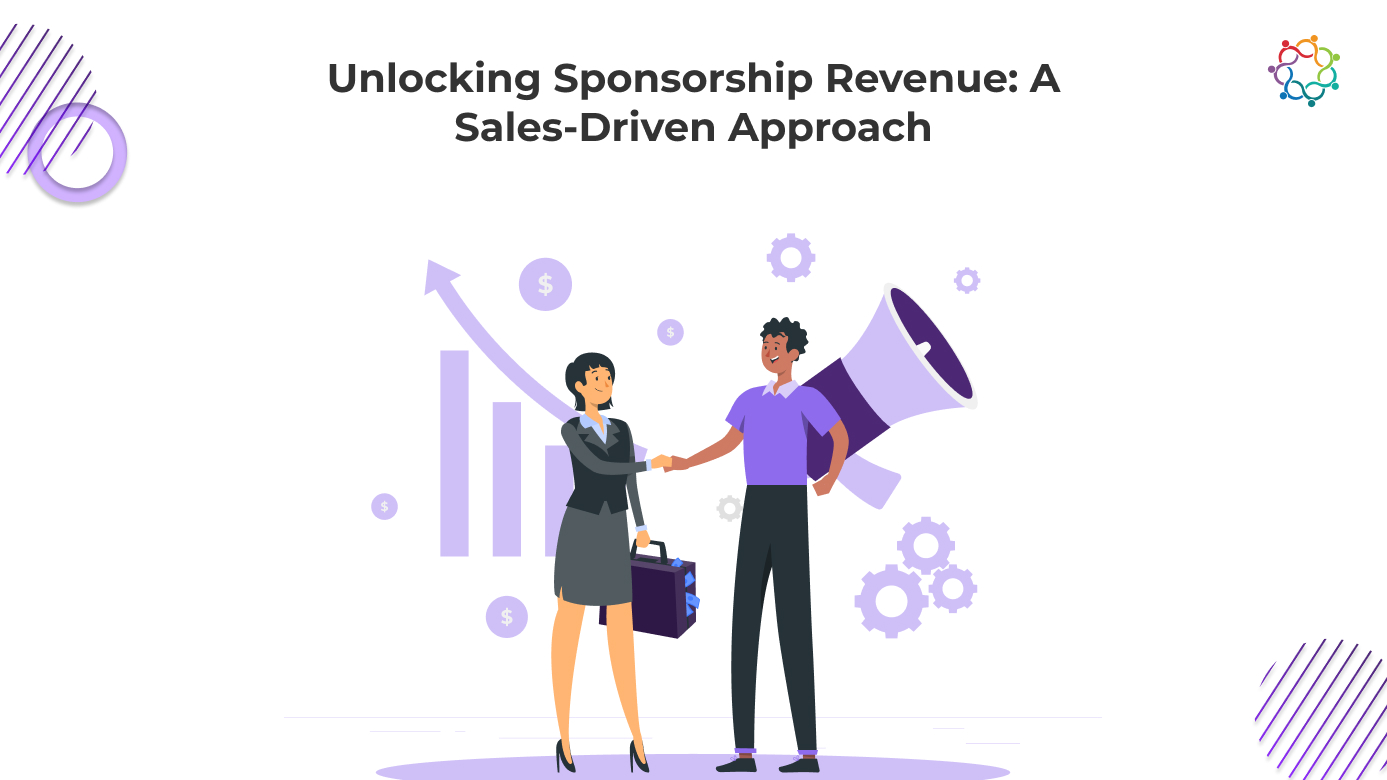
Sponsorships are a critical revenue stream for events, providing financial support while offering sponsors valuable brand exposure and lead generation opportunities. To maximize sponsorship success, sales teams must take a strategic approach to identifying, securing, and managing partnerships.
Sales teams have deep relationships within the industry, making them well-positioned to:
A targeted approach ensures that sponsorship opportunities align with attendee interests, maximizing value for all parties.
A one-size-fits-all approach to sponsorships no longer works. Sales and event teams should collaborate to create tailored sponsorship packages that offer:
By designing diverse sponsorship packages, organizers can appeal to a broader range of sponsors while enhancing the event experience for attendees.
Sales teams play a key role in structuring sponsorship agreements that are beneficial for both sponsors and event organizers. Key considerations include:
A well-negotiated sponsorship agreement leads to long-term partnerships and repeat sponsorships for future events.
Sponsorship success goes beyond securing deals—it requires ongoing relationship management. Best practices include:
Maintaining strong sponsor relationships leads to higher retention rates and increased sponsorship revenue over time.
Measuring Sponsorship ROI: Demonstrating Value to Secure Future Deals
To ensure continued sponsorship success, it’s crucial to track and report on key performance indicators, such as:
Providing sponsors with detailed post-event reports showcasing their impact helps secure renewals and expand sponsorship opportunities in future events.
A successful event isn’t just about attendance—it’s about the tangible business outcomes it delivers. Sales teams and event organizers must track key metrics to assess event effectiveness and optimize future strategies.
To measure the effectiveness of sales-driven event strategies, organizations should monitor:
These insights help sales teams refine their engagement strategies and prioritize high-value opportunities.
Event ROI isn’t just about revenue—it’s about efficiency and impact. Businesses should evaluate:
A data-driven approach ensures that events remain a profitable and strategic investment.
Continuous improvement requires feedback from multiple sources:
By leveraging feedback, organizations can refine event strategies and enhance sales effectiveness for future engagements.
Using Data to Optimize Strategies: Driving Continuous Improvement
Post-event analysis shouldn’t just be a review—it should drive actionable changes. Businesses can use event and sales data to:
Continuous optimization ensures that each event builds upon past successes, delivering greater value to attendees, sponsors, and sales teams.
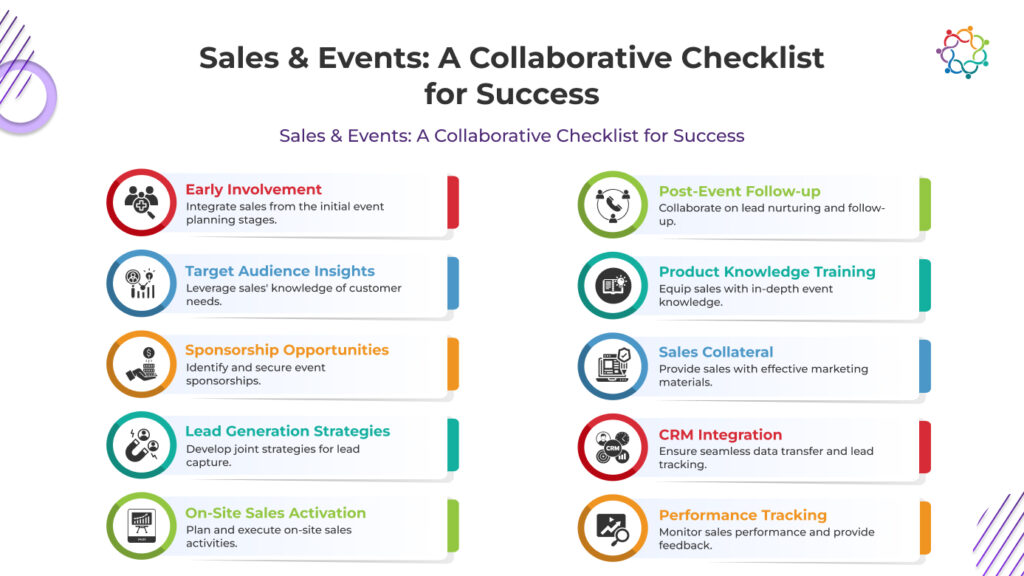
The synergy between sales and events is essential for maximizing business impact. By breaking down silos, integrating sales into event planning, and leveraging sponsorship opportunities strategically, organizations can transform events into powerful revenue-generating platforms.
A strategic and data-driven approach ensures that events generate not only leads but also long-term customer relationships and measurable business growth. Implementing these strategies with a platform like Samaaro can streamline processes, improve sales alignment, and maximize event ROI.
Book a demo or start your free trial today to see how Samaaro can help you turn your events into revenue-driving opportunities.
Event marketing is evolving at an unprecedented pace. With rapid technological advancements and shifting audience expectations, staying ahead of the curve is crucial for event organizers. In 2025, successful event marketing is no longer about blasting promotions to broad audiences—it’s about data-driven decision-making, personalized experiences, and innovative engagement strategies.
This blog explores cutting-edge event marketing strategies that will help organizers achieve measurable success, drive engagement, and maximize event ROI. From AI-powered copywriting to immersive experiences, these trends will shape the future of event marketing.
Gone are the days when demographics alone dictated event marketing strategies. In 2025, marketers are diving deeper into audience insights to craft hyper-targeted campaigns that resonate on a personal level.
Instead of relying solely on basic demographics (age, location, industry), event marketers now analyze psychographics, behavioral data, and intent signals. Understanding attendee motivations, pain points, and preferences allows for more relevant and effective messaging.
With AI and machine learning, event marketers can now access real-time data on attendee engagement, content performance, and registration trends. This enables agile decision-making, allowing marketers to tweak campaigns mid-flight for maximum impact.
Personalization is no longer optional—it’s expected. Leveraging data from previous events, browsing behavior, and engagement patterns, event organizers can deliver highly customized messages that boost conversions.
Predictive analytics helps marketers anticipate attendee behavior by analyzing past interactions. This data helps refine ad targeting, content recommendations, and registration incentives to increase attendance rates.
Understanding which marketing channels drive the most event registrations is critical. Multi-touch attribution modeling allows marketers to accurately measure the impact of email campaigns, social media ads, influencer partnerships, and other promotional efforts, ensuring marketing budgets are allocated effectively.
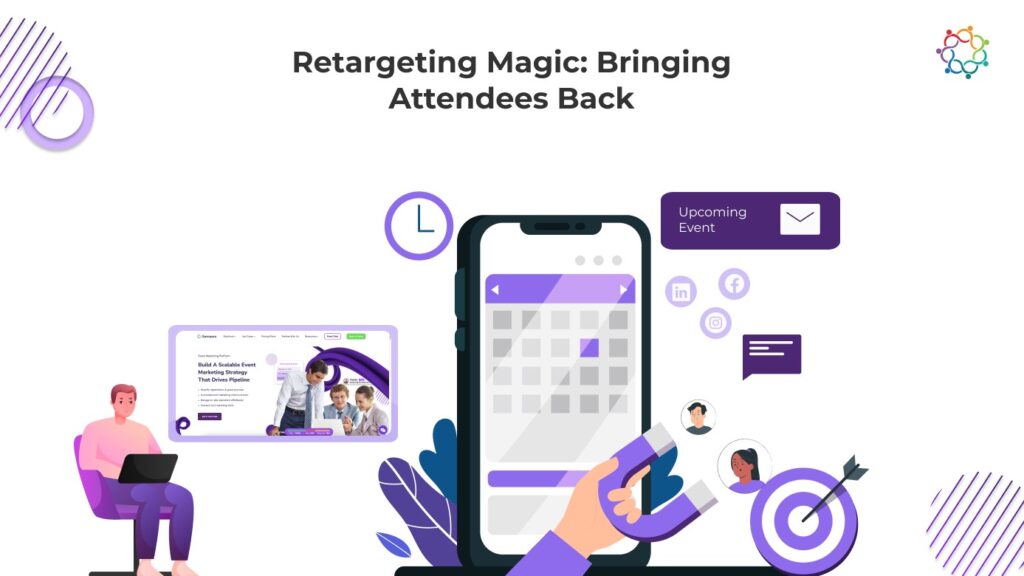
Not everyone registers the first time they encounter an event promotion. Retargeting keeps potential attendees engaged and encourages them to take action.
Using tracking pixels, event marketers can retarget website visitors who browsed event pages but didn’t register. Displaying personalized ads with countdowns, speaker highlights, or exclusive discounts can nudge them to sign up.
Platforms like Facebook, LinkedIn, and Instagram allow for highly targeted retargeting ads, ensuring that users who engaged with event posts or watched videos see relevant follow-ups.
Abandoned registration emails work wonders. Sending reminders to users who started the sign-up process but didn’t complete it, along with an incentive (such as an early bird discount), can boost conversion rates.
AI-driven programmatic ads automate the process of serving event promotions to the most relevant audiences based on their online behavior, increasing engagement and registrations.
Instead of generic ads, AI-powered dynamic retargeting shows customized ads featuring sessions, speakers, or networking opportunities based on an attendee’s browsing history.
The most effective strategy is a multi-channel approach. Syncing website, email, and social media retargeting creates a cohesive experience that guides potential attendees toward registration.

AI is revolutionizing content creation, allowing marketers to scale copywriting efforts without sacrificing quality.
Tools like ChatGPT, Jasper, and Copy.ai generate event marketing copy in seconds, from social media posts to ad creatives and email subject lines.
AI-generated content requires human refinement to maintain brand voice and authenticity. A hybrid approach ensures accuracy and relevance.
As AI-generated content becomes more prevalent, maintaining transparency and ethical practices in marketing messaging is essential.
Modern events are shifting from passive presentations to highly engaging, interactive experiences that captivate audiences and encourage participation. Organizers are leveraging cutting-edge technology and engagement strategies to create events that are not just informative but also memorable and immersive.
By integrating interactive and immersive elements, events are evolving into dynamic experiences that keep attendees engaged before, during, and after the event.
A successful event is more than just a one-time experience—it’s an opportunity to build a thriving community. Engaged attendees are more likely to return for future events, interact with event content, and contribute to discussions year-round.
Email remains a powerful tool for nurturing an engaged audience beyond the event. Successful strategies include:
By focusing on long-term engagement and community-building, event organizers can turn one-time attendees into lifelong advocates, ensuring sustainable success for future events.
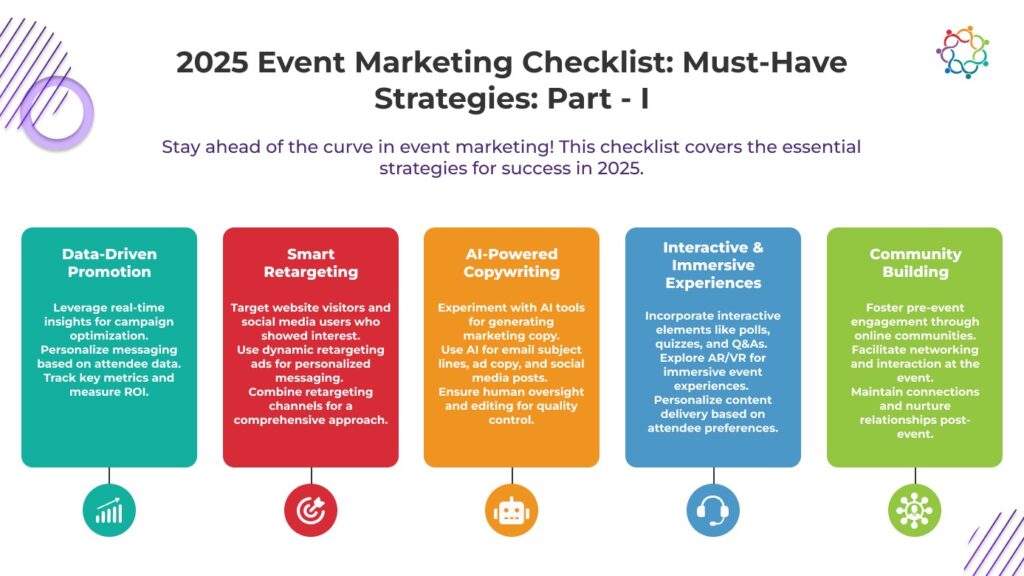

The future of event marketing is about leveraging data, AI, and interactive engagement strategies to drive real results. In 2025, marketers who embrace personalization, automation, and immersive experiences will stand out.
By implementing these strategies, event organizers can maximize attendance, enhance engagement, and boost event ROI. Platforms like Samaaro play a crucial role in streamlining event marketing efforts. With AI-powered event promotion tools, data-driven insights, and seamless attendee engagement features, Samaaro helps event marketers execute high-impact campaigns that deliver measurable success.
Are you ready to revolutionize your event marketing strategy for 2025? Start implementing these trends today and watch your events thrive!
The event technology landscape is evolving at a rapid pace, redefining how events are planned, executed, and experienced. From AI-powered matchmaking to immersive AR/VR experiences, technological innovations are transforming the way attendees engage with events and how organizers measure success.
As we step into 2025, embracing cutting-edge event tech is no longer optional—it’s essential for staying ahead of the competition. In this blog, we explore the most groundbreaking event technology trends that are shaping the future of events, ensuring higher engagement, better networking, and increased ROI for organizers and attendees alike.
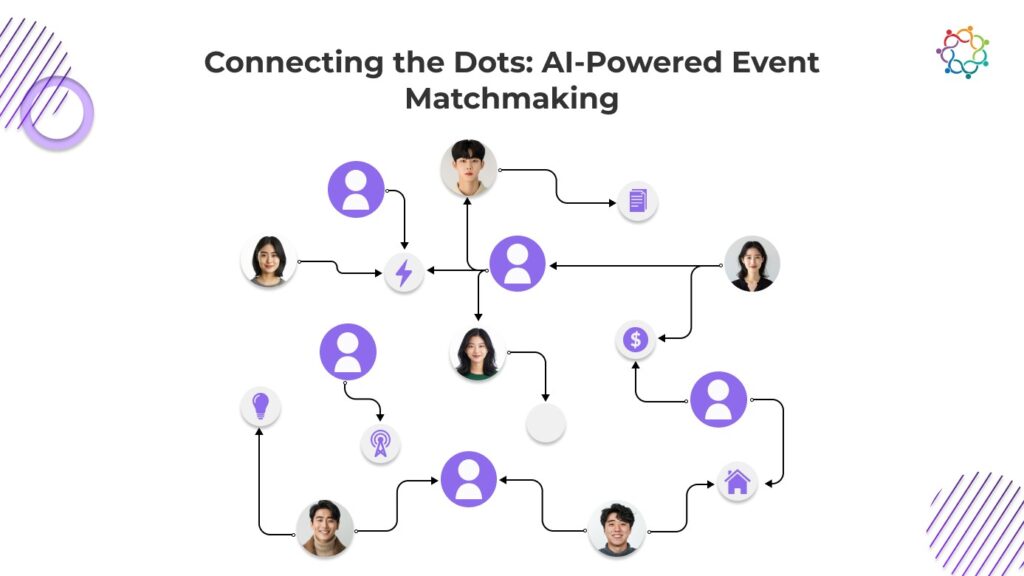
One of the biggest challenges at events is facilitating meaningful connections among attendees. Traditional networking methods, such as random meetups or manual searches, often lead to missed opportunities and inefficient interactions. AI is transforming event networking by intelligently pairing attendees based on interests, expertise, and goals, ensuring that every connection is valuable and relevant.
By integrating AI into event matchmaking and networking, organizers can transform their events into thriving hubs of meaningful interactions, ensuring that attendees leave with valuable connections and insights that extend beyond the event itself.
Event technology is evolving rapidly, and smart badges and wearables are playing a crucial role in enhancing attendee experiences while streamlining event operations. These devices are transforming traditional event logistics by making check-ins faster, networking smoother, and data collection more insightful.
Smart badges and wearables are no longer just convenient add-ons—they are becoming essential tools for delivering frictionless, data-driven, and engaging event experiences.
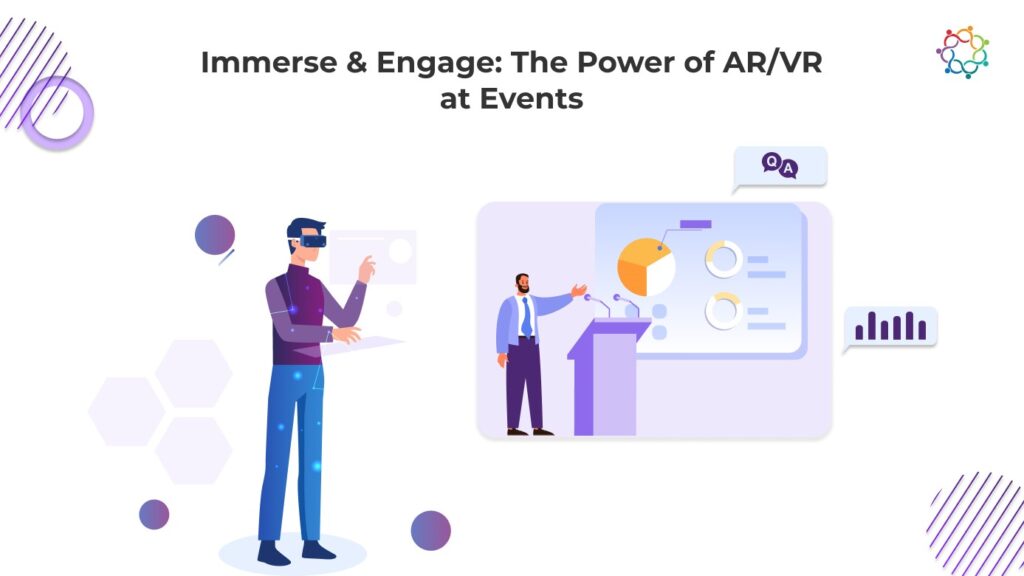
Augmented Reality (AR) and Virtual Reality (VR) are transforming event experiences by creating immersive, interactive environments that captivate attendees. These technologies go beyond traditional event formats, enabling deeper engagement, better networking, and more memorable interactions.
By integrating AR and VR, event organizers can create unforgettable experiences that blend physical and digital worlds, ensuring attendees remain engaged and excited throughout the event.
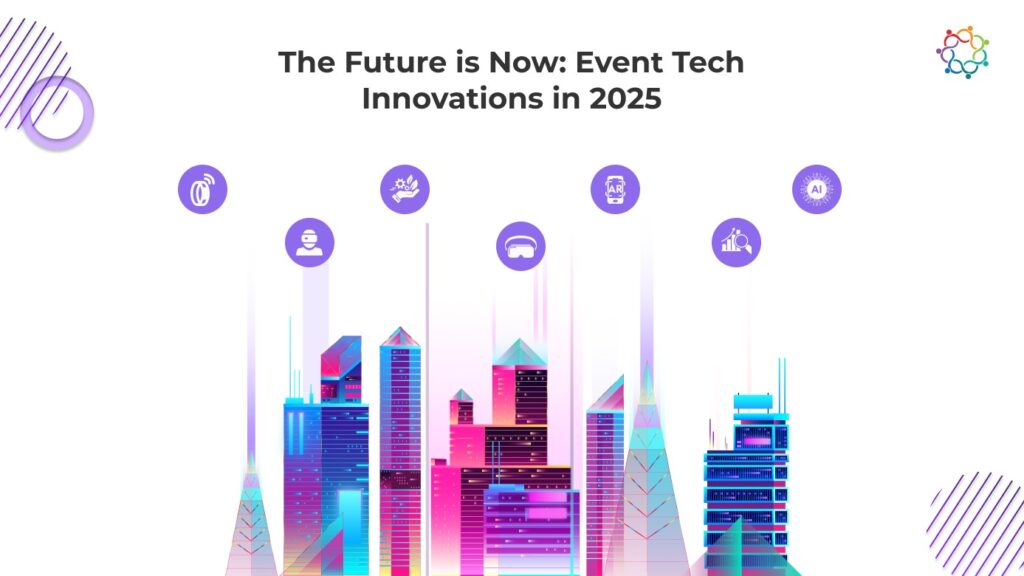
The metaverse is redefining how events are hosted, creating immersive, interactive experiences that go beyond traditional virtual and hybrid formats. By blending physical and digital worlds, the metaverse offers attendees new ways to engage, network, and participate in events like never before.
However, as technology advances and platforms become more user-friendly and cost-effective, the metaverse is set to become a mainstream event format, offering unparalleled engagement and scalability.
The metaverse is not just a trend—it’s a glimpse into the future of events, where digital and physical interactions merge to create extraordinary experiences.
As sustainability becomes a growing priority, event technology is stepping in to reduce the environmental impact of in-person and hybrid events. From minimizing waste to optimizing energy use, tech-driven solutions are helping organizers create greener, more responsible events.
By leveraging event tech for sustainability, organizers can create eco-friendly experiences without compromising engagement or efficiency.
Event data has become a powerful asset, helping organizers optimize engagement, improve attendee experiences, and maximize ROI. With AI-driven insights and real-time tracking, event planners can make data-backed decisions that enhance every aspect of an event.
By harnessing the power of event data and analytics, organizers can transform their events into more engaging, efficient, and impactful experiences.
The event industry is on the brink of a technological revolution. From AI-powered networking to immersive AR/VR experiences and smart badges, event technology in 2025 is driving more personalized, engaging, and data-driven events.
Embracing these innovations will not only enhance attendee experiences but also improve operational efficiency, sustainability, and event ROI. As the future of events continues to evolve, staying ahead of these trends is key to delivering impactful and memorable experiences.
At Samaaro, we empower event organizers with AI-driven marketing, smart networking, and data analytics to create high-impact events. Whether you’re looking to optimize attendee engagement, streamline operations, or boost event success, Samaaro’s event tech solutions can help you stay ahead of the curve. Book a demo today to see how you can transform your events with cutting-edge technology.
The UAE has emerged as one of the world’s premier destinations for events, attracting global brands, corporate gatherings, and high-profile entertainment spectacles. As a thriving business and tourism hub, cities like Dubai and Abu Dhabi host a vast array of events, ranging from corporate conferences to luxury brand showcases and cultural festivals. The UAE’s strategic location, excellent infrastructure, and diverse audience create immense opportunities for event organizers.
However, marketing and selling events in the UAE requires an understanding of the region’s unique cultural and business environment. From digital-first marketing approaches to respecting cultural sensitivities, event professionals must tailor their strategies for maximum impact. In this guide, we’ll explore the best practices for event marketing in the UAE, key audience insights, and how platforms like Samaaro can help event organizers succeed.
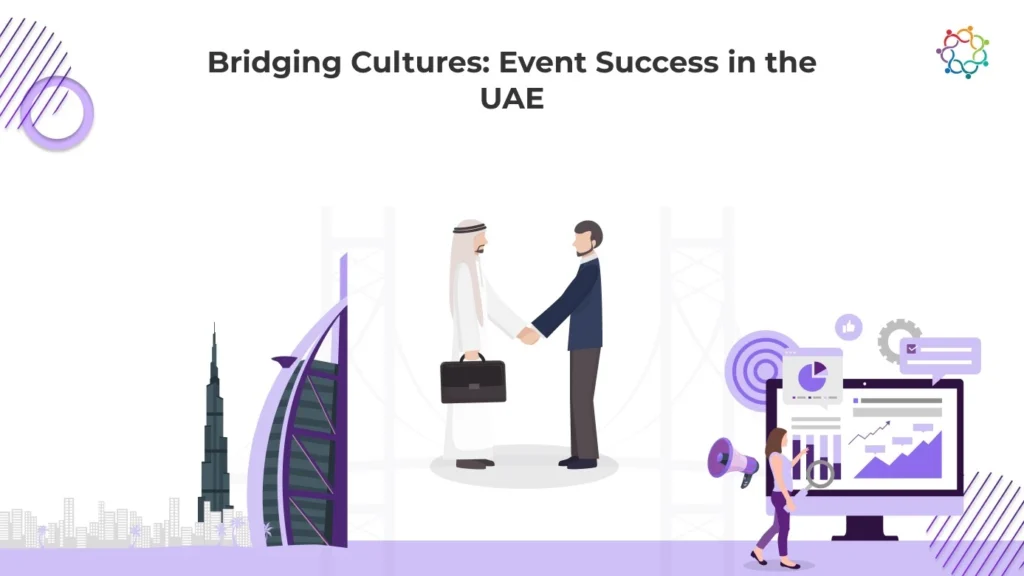
The UAE is home to a highly diverse population, comprising both Emirati nationals and a vast expatriate community. With over 80% of the population consisting of expats from countries such as India, the UK, the Philippines, and Egypt, event organizers must consider a multicultural audience when planning marketing efforts.
Key demographics include:
Understanding audience motivations helps in crafting targeted event messaging:
UAE audiences are highly active online, making digital marketing essential. Key insights include:
Event marketers must be mindful of:
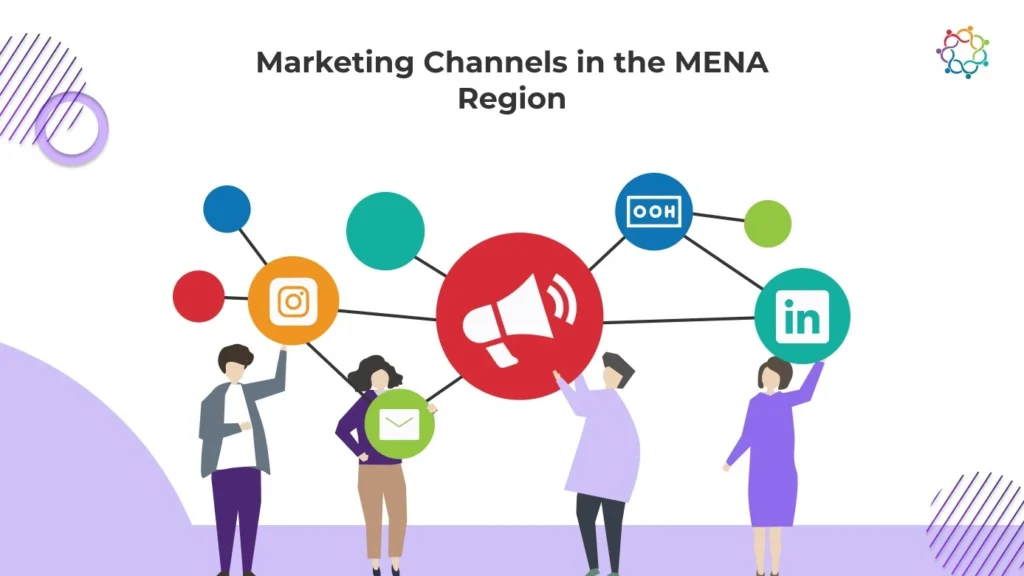
Social media plays a critical role in event promotions in the UAE. Event organizers should tailor their approach to each platform:
Paid advertising allows precise targeting and measurable ROI:
Email marketing remains a powerful tool for event promotions in the UAE:
Influencer collaborations can significantly boost event awareness:
Traditional marketing remains relevant, especially for high-end and large-scale events:
Radio and TV remain effective for mass outreach:
Strategic PR efforts help secure credibility and media coverage:
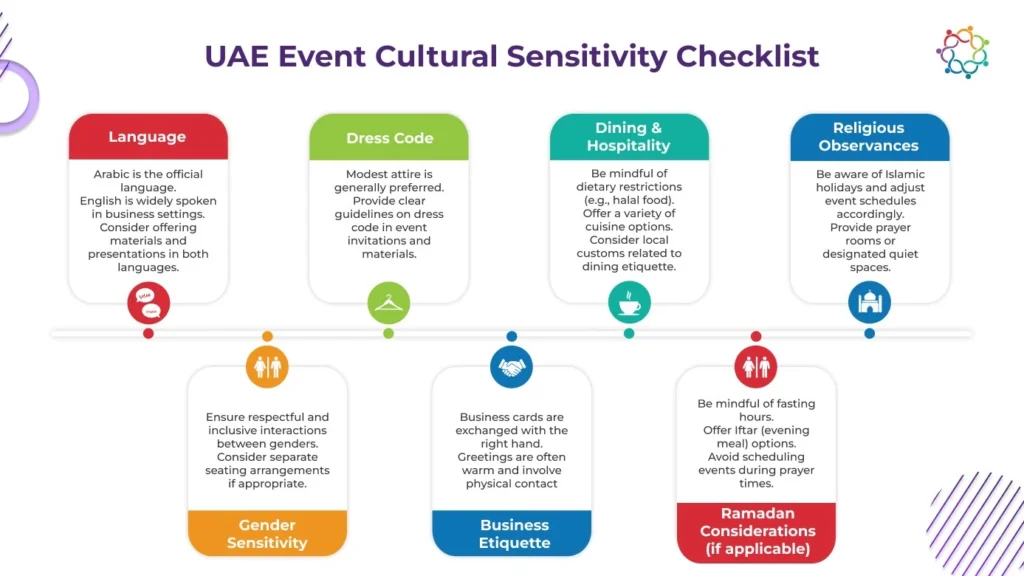
When hosting an event, understanding and respecting cultural nuances is key to creating an inclusive and engaging experience for all attendees. From language preferences to religious observances, every detail contributes to making guests feel comfortable and valued. Here’s how to integrate cultural sensitivity into your event planning:
Language plays a crucial role in effective event engagement. In regions where Arabic is the primary language, offering bilingual communication in both Arabic and English ensures that all attendees can fully engage with the event.
By addressing language diversity, you enhance accessibility and create a more welcoming experience for all participants.
Different cultures have varying expectations when it comes to attire and social etiquette. It’s important to:
Understanding these social norms helps in building trust and fostering a professional yet culturally appropriate atmosphere.
Food and hospitality are central to event experiences, and being mindful of cultural dietary preferences ensures that every guest feels accommodated.
Providing thoughtful hospitality not only enhances attendee satisfaction but also reflects respect for cultural diversity.
Religious customs and holidays can impact event attendance and scheduling. Being mindful of these factors is crucial for event success.
By taking religious considerations into account, you create an inclusive environment that respects the beliefs and traditions of your attendees.
Ensuring gender inclusivity in events is essential for fostering an environment of equality and respect.
By being proactive about gender sensitivity, you demonstrate cultural awareness and create an event experience that is comfortable and welcoming for all attendees.
Cultural considerations should never be an afterthought in event planning. By taking a thoughtful approach to language, dress codes, hospitality, religious customs, and gender inclusivity, you ensure that your event is truly engaging for a diverse audience. When attendees feel respected and valued, their engagement levels rise, leading to a more successful and impactful event.
The UAE is a global hub for business, innovation, and networking, making it an ideal location for corporate events. However, attracting the right audience and ensuring high attendance requires a strategic approach. Here are key tactics to drive corporate event attendance in the UAE:
Personalization is key to capturing attention in a competitive event landscape. A generic invitation may go unnoticed, but a well-crafted, personalized message can significantly improve response rates.
By making your invitations relevant and compelling, you increase the likelihood of attracting high-quality attendees.
One of the biggest draws for corporate events is the opportunity to network with industry leaders, potential clients, and like-minded professionals.
Emphasizing networking benefits in your promotional campaigns can significantly boost attendance rates.
Corporate professionals value insightful, actionable content that helps them stay ahead in their industry. To drive attendance, your event must offer engaging and relevant content.
Promoting the strength of your agenda will make your event a must-attend for professionals looking to gain knowledge and insights.
Providing unique and exclusive experiences adds an element of prestige and makes your event more appealing.
Offering something attendees can’t get elsewhere makes your event stand out.
Collaborating with industry organizations, media partners, and sponsors can significantly amplify event visibility and credibility.
Strong partnerships help extend your event’s reach and attract the right audience.
A well-structured incentive strategy can encourage early registrations and group attendance.
Incentives create urgency and provide additional motivation for people to sign up.
Technology plays a crucial role in enhancing event marketing, engagement, and overall experience.
Utilizing event technology ensures a seamless attendee experience and maximizes engagement before, during, and after the event.
Driving attendance at corporate events in the UAE requires a blend of strategic marketing, exclusive experiences, and cutting-edge technology. By personalizing invitations, providing strong networking opportunities, and leveraging incentives, you can attract high-value attendees and create a memorable event.
Marketing and selling events in the UAE requires a deep understanding of the region’s unique business culture, audience preferences, and engagement strategies. From crafting personalized invitations and leveraging networking opportunities to incorporating exclusive experiences and event technology, every detail matters in driving attendance and ensuring success.
Cultural sensitivity plays a crucial role in event planning. Whether it’s offering bilingual communication, respecting local customs, or providing tailored hospitality, adapting to the UAE’s cultural landscape enhances attendee experience and fosters stronger connections.
By implementing the strategies outlined in this guide, event planners can create impactful experiences that attract the right audience and deliver measurable success.
At Samaaro, we understand the complexities of event marketing in the UAE. Our AI-powered event marketing platform helps you streamline your outreach, personalize attendee engagement, and optimize event performance with data-driven insights. Book a demo today and see how Samaaro can help you elevate your event strategy in the UAE.

Built for modern marketing teams, Samaaro’s AI-powered event-tech platform helps you run events more efficiently, reduce manual work, engage attendees, capture qualified leads and gain real-time visibility into your events’ performance.
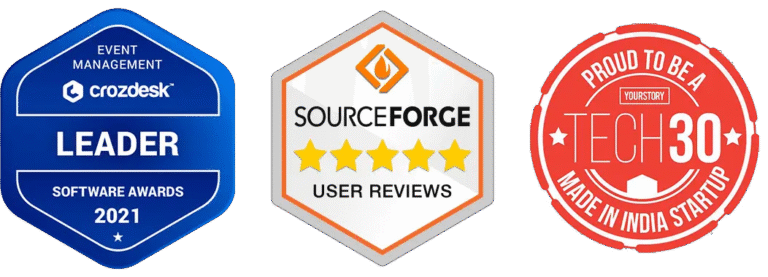
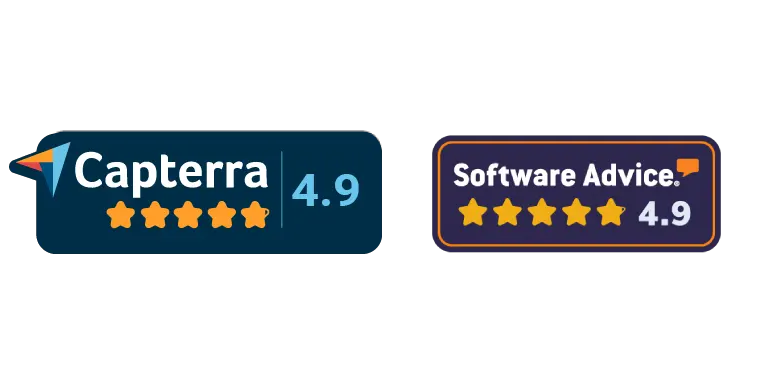
© 2025 — Samaaro. All Rights Reserved.